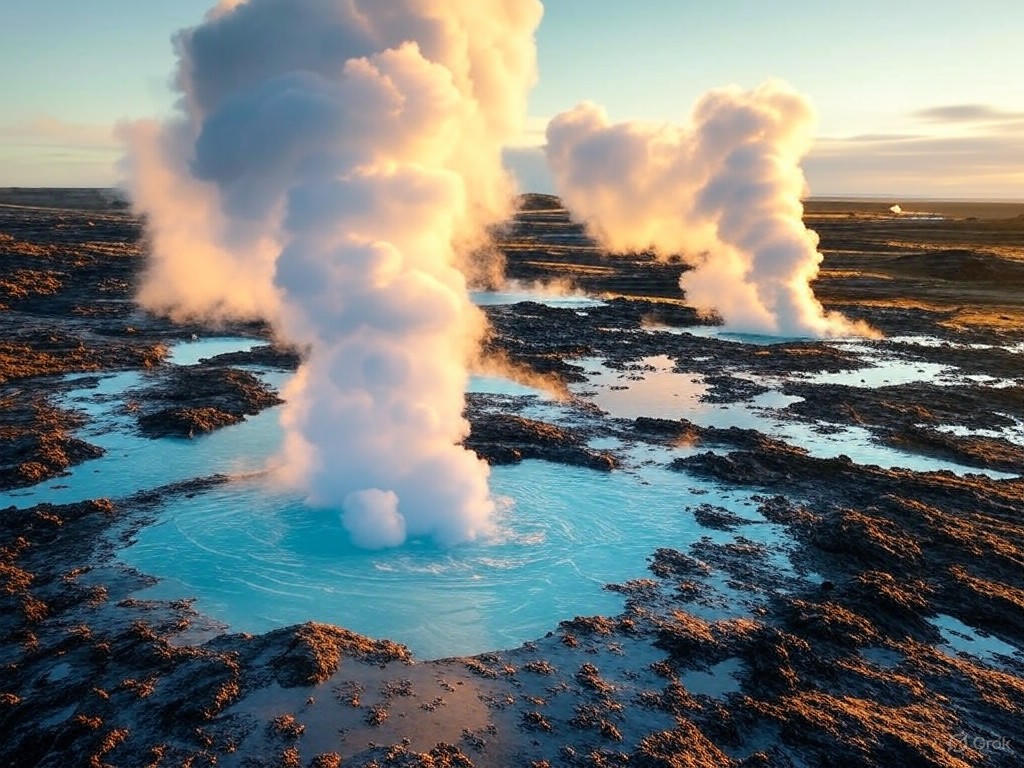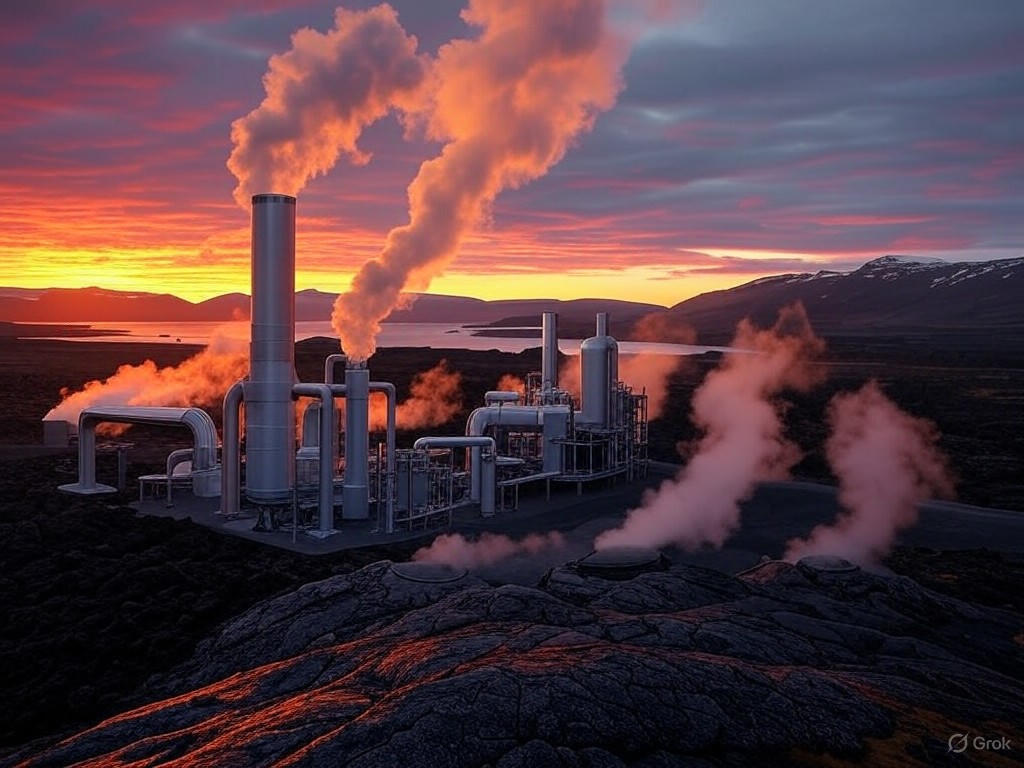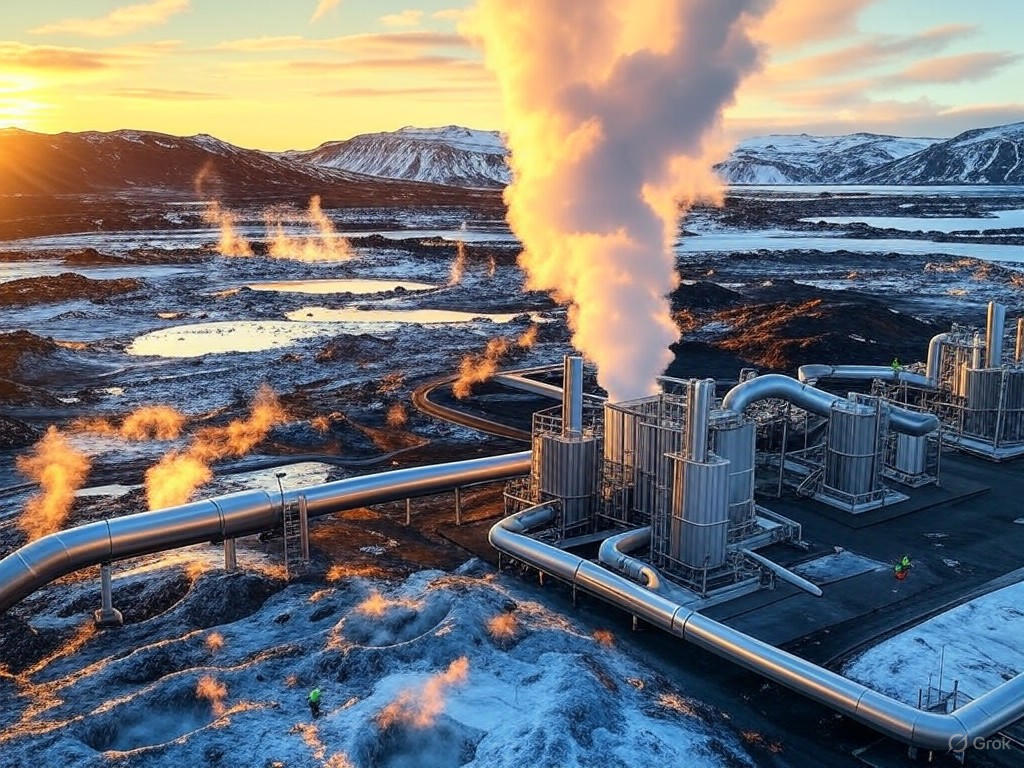Geothermal Energy in Iceland: Sustainable Power
In the vast, unforgiving expanse of Iceland, where volcanic whispers carve through ancient rock and steam rises like forgotten dreams, lies a testament to human ingenuity and the earth's enduring gifts. Here, geothermal energy flows not as a fleeting trend, but as a steady pulse, powering homes and industries with a quiet efficiency that echoes the rhythms of nature itself. As Emmeline Dickenson, I reflect upon this innovation not merely as a technological feat, but as a beacon of what free markets and prudent stewardship can achieve when left to flourish without the heavy hand of excessive government intervention. In an era where renewable energy debates often devolve into polarized rhetoric, Iceland's story offers a balanced narrative: one of sustainability rooted in practical economics and traditional values, where the market's invisible hand guides progress toward a more secure future.
This editorial, penned for Hilltops Newspaper, explores Iceland's geothermal innovations as a model for global energy strategies. Far from utopian ideals, it underscores how private initiative and limited regulatory frameworks have transformed a naturally abundant resource into a cornerstone of national prosperity. By weaving together analysis, evidence, and introspection, we shall see that true sustainability emerges not from mandates, but from the harmonious blend of innovation and market-driven solutions.
The Volcanic Canvas: Iceland's Geothermal Legacy
Iceland, an island nation forged from fire and ice, sits atop the Mid-Atlantic Ridge, where tectonic plates dance in eternal conflict. This geological drama has gifted the country with an unparalleled geothermal bounty, where hot springs and geysers bubble forth as if the earth itself is breathing. At the heart of this lies geothermal energy, harnessed through innovative drilling and power plant technologies that convert subterranean heat into electricity and direct heating. Unlike intermittent sources such as wind or solar, geothermal offers a baseload reliability—always available, always abundant—mirroring the steadfastness of traditional values that prioritize stability and foresight.
Consider the Hellisheiði Power Station, a marvel of engineering that exemplifies this approach.  The dramatic eruption of Iceland's geysers, a natural spectacle that underscores the raw power of geothermal resources fueling modern sustainability. Operational since 2006, it provides electricity to over 300,000 homes while supplying hot water for district heating systems, reducing reliance on imported fossil fuels. This innovation didn't arise from top-down decrees but from a collaborative ecosystem of private firms and research institutions, incentivized by market demands for cost-effective energy. As Iceland's Geothermal Energy Success in the Wall Street Journal notes, the country's energy sector thrives on a model where minimal government interference allows for adaptive entrepreneurship, fostering an environment where renewable energy innovations can scale without bureaucratic hurdles.
The dramatic eruption of Iceland's geysers, a natural spectacle that underscores the raw power of geothermal resources fueling modern sustainability. Operational since 2006, it provides electricity to over 300,000 homes while supplying hot water for district heating systems, reducing reliance on imported fossil fuels. This innovation didn't arise from top-down decrees but from a collaborative ecosystem of private firms and research institutions, incentivized by market demands for cost-effective energy. As Iceland's Geothermal Energy Success in the Wall Street Journal notes, the country's energy sector thrives on a model where minimal government interference allows for adaptive entrepreneurship, fostering an environment where renewable energy innovations can scale without bureaucratic hurdles.
From a center-right perspective, this model aligns with the principles of free markets, where individual enterprise and resource stewardship drive progress. Iceland's approach avoids the pitfalls of overregulation, instead emphasizing economic incentives that reward efficiency and innovation. Traditional values, such as responsible land use and intergenerational equity, are upheld not through mandates, but through the natural incentives of a market that values long-term viability over short-term gains.
Analyzing the Economic and Environmental Ripple Effects
Delving deeper, the analysis reveals how Iceland's geothermal advancements have ripple effects across economics, industry, and global sustainability efforts. Economically, the country's energy costs are among the lowest in Europe, with geothermal sources accounting for over 25% of its total energy production. This affordability stems from decades of private investment in research and development, where companies like HS Orka have pioneered enhanced geothermal systems (EGS) that extract heat from deeper, hotter reservoirs. Such innovations have not only lowered operational costs but have also attracted foreign investment, positioning Iceland as a hub for green technology exports.
Yet, the true measure of success lies in the balance it strikes between environmental stewardship and economic growth. Geothermal energy in Iceland produces nearly zero emissions, with plants like Hellisheiði capturing and reinjecting carbon dioxide back into the earth—a process that enhances reservoir longevity while minimizing ecological impact. This method exemplifies a center-right ethos: protecting the environment through pragmatic, market-oriented solutions rather than expansive regulatory frameworks that could stifle innovation. As Geothermal Innovations in Iceland from IEEE Spectrum explains, the technology's scalability offers a pathway for other nations to reduce fossil fuel dependence without sacrificing economic competitiveness.
To illustrate, consider the broader implications for industries. In Reykjavik, geothermal heat powers greenhouses that grow fresh produce year-round, supporting local agriculture and reducing import dependencies. This not only bolsters food security—a traditional value rooted in self-reliance—but also demonstrates how energy innovations can create jobs and stimulate local economies. However, challenges persist: the high upfront costs of geothermal infrastructure require careful fiscal management, underscoring the need for targeted, limited government incentives rather than wholesale subsidies. Sustainability in Renewable Energy Markets from the U.S. Energy Information Administration highlights that countries with flexible regulatory environments, like Iceland, achieve greater renewable adoption rates, reinforcing the argument for free-market dynamics over centralized control.
 The Hellisheiði Power Plant at dusk, a beacon of sustainable energy innovation that illuminates the path for market-driven environmental progress.
The Hellisheiði Power Plant at dusk, a beacon of sustainable energy innovation that illuminates the path for market-driven environmental progress.
Evidence of a Balanced Path Forward
Evidence from various sources paints a compelling picture of Iceland's geothermal success as a replicable model. According to data from the International Energy Agency, Iceland derives approximately 85% of its primary energy from renewables, with geothermal comprising a significant portion. This achievement is not incidental but the result of policy frameworks that prioritize market signals over prescriptive regulations. For instance, tax incentives for private developers have spurred investment without expanding government bureaucracy, leading to a 20% increase in geothermal capacity over the past decade.
Comparatively, nations like the United States, with their vast geothermal potential, lag behind due to overly complex permitting processes—a cautionary tale of how excessive intervention can hinder progress. Market-Driven Renewables in Iceland from Forbes argues that embracing free-market principles could unlock similar gains elsewhere, emphasizing that true sustainability arises from economic incentives aligned with environmental goals.
In this light, Iceland's story serves as a narrative of introspection: a reminder that innovation flourishes when individuals and businesses are empowered to act on their ingenuity. Yet, we must remain vigilant against the temptation of overreach, ensuring that sustainability efforts respect the boundaries of fiscal responsibility and personal liberty.
Reflections on a Steadier Horizon
As we conclude, let us pause and reflect upon the earth's quiet strength, much like the poet who finds wisdom in the natural world. Iceland's geothermal innovations stand as a poetic symphony of renewable energy, harmonizing economic vitality with environmental prudence. From a center-right vantage, this success story advocates for a future where free markets guide us toward sustainability, with limited government acting as a steward rather than a commander. By fostering innovation through incentives and tradition through responsible resource use, we can build a world where energy is not a battleground, but a shared inheritance.
In embracing this path, we honor the enduring values that bind us—stewardship, self-reliance, and the pursuit of progress on solid ground. Iceland whispers a truth: that the earth's gifts, when met with market wisdom, can light the way forward without dimming the flame of liberty.

